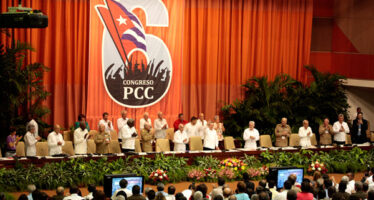Obama’s state of the union address: US must seize ‘Sputnik moment’
![]()
President appeals to Republicans for co-operation to ‘win the future’ and warns that rise of China is threat to US influence
Chris McGreal in Washington
Highlights from the US president Barack Obama’s annual state of the union address before a joint session of Congress and the supreme court on Capitol Hill Link to this video
In the annual state of the union address, the US president appealed for the Republicans to co-operate to “win the future” and said the present generation faces its “Sputnik moment”, requiring government investment in research, infrastructure and education.
He said that would be paid for, in part, by eliminating subsidies to hugely profitable oil companies.
“Half a century ago, when the Soviets beat us into space with the launch of a satellite called Sputnik, we had no idea how we’d beat them to the moon,” he told congress. “The science wasn’t there yet. Nasa didn’t even exist.
“But after investing in better research and education, we didn’t just surpass the Soviets – we unleashed a wave of innovation that created new industries and millions of new jobs.
This is our generation’s Sputnik moment. At stake is whether new jobs and industries take root in this country or somewhere else.
“It’s whether the hard work and industry of our people is rewarded. It’s whether we sustain the leadership that has made America not just a place on a map, but a light to the world.”
The president’s call – in a speech that ostensibly called for unity but laid bare the ideological divide with the Republicans – was swiftly rejected by his opponents, who said that the real threat to US global dominance was the country’s rapidly deepening debt.
They said that what Obama called investment, they call borrowing and spending.
But instant polling on CNN showed a rise in support for the president’s policies, with more than three-quarters of respondents saying they had a favourable view of the speech. A similar number said they were more optimistic after the address.
-
The president said the US faced a changed world, adding: “The rules have changed. In a single generation, revolutions in technology have transformed the way we live, work and do business.
“Meanwhile, nations like China and India realised that, with some changes of their own, they could compete in this new world. And so they started educating their children earlier and longer, with greater emphasis on maths and science.
“They’re investing in research and new technologies. Just recently, China became home to the world’s largest private solar research facility, and the world’s fastest computer.”
Obama said he would send a budget to congress that invested in research – especially clean energy technology, which he said could see 1m electric vehicles on US roads within four years and break dependence on fossil fuels, although his clean energy commitment involves a heavy reliance on nuclear power. But he did not directly speak about climate change or global warming.
He also called for a leap forward in educational standards, saying: “Think about it. Over the next 10 years, nearly half of all new jobs will require education that goes beyond a high school degree. And yet as many as a quarter of our students aren’t even finishing high school.”
While appealing for co-operation, the president laid bare the ideological divide with the Republicans. In the face of a Republican leadership demanding spending cuts and action on the deficit, he proposed a five year freeze on non-security related spending that would require “painful cuts”.
But they come nowhere near those proposed by his political opponents who instinctively recoil from the idea of greatly increased government spending on research, education and promises to greatly improve internet access and expand high speed rail.
Hours before Obama’s speech, House Republicans passed a resolution in support of rolling back spending to levels to where they were before Obama came to power – something requiring far deeper cuts than those he is proposing.
Obama attempted to pressure the Republican leadership over its threat of obstructionist tactics by appealing for it to consider the national good.
“With their votes, the American people determined that governing will now be a shared responsibility between parties,” he said.
“New laws will only pass with support from Democrats and Republicans. We will move forward together, or not at all – for the challenges we face are bigger than party, and bigger than politics.
“Cutting the deficit by gutting our investments in innovation and education is like lightening an overloaded airplane by removing its engine. It may feel like you’re flying high at first, but it won’t take long before you’ll feel the impact.”
Republicans, however, spurned Obama in a response by congressman Paul Ryan, who said the real threat to US dominance was the country’s huge budget.
“We are at a moment where, if government’s growth is left unchecked and unchallenged, America’s best century will be considered our past century,” he said.
“This is a future in which we will transform our social safety net into a hammock, which lulls able-bodied people into lives of complacency and dependency.”
Ryan said that, if the government did not address spending, the US would face the same sort of crisis as those gripping Ireland, Greece and Britain.
“Depending on bureaucracy to foster innovation, competitiveness and wise consumer choices has never worked – and it won’t work now,” he said.
“The facts are clear: since taking office, President Obama has signed into law spending increases of nearly 25% for domestic government agencies – an 84% increase when you include the failed stimulus.
“All of this new government spending was sold as ‘investment’. Yet, after two years, the unemployment rate remains above 9% and government has added over $3tn to our debt.”
Obama defended his controversial healthcare reforms – which Republicans are attempting to overturn – saying he was open to improving them but would not abandon the principle of ensuring healthcare for almost every American.
Members of Congress wore ribbons in support of Gabrielle Giffords, their colleague who was wounded during an assassination attempt in Tucson in which six other people were killed, and applauded the mention of her name.
Several members of both parties moved over to the other side’s seating in a demonstration of bipartisanship in the wake of the debate over aggressive political rhetoric following the Tucson shootings.
Among those sitting with Michelle Obama were the parents and brother of Christina Taylor Green, the nine year-old girl who died in the shooting.
World news
- State of the Union address ·
- Barack Obama ·
- US Congress ·
- Obama administration ·
- Republicans ·
- Democrats
-
More on this story
-

Michael Tomasky: Will it wrongfoot Republicans?
Michael Tomasky: Going beyond Obama’s usual ‘post-partisan’ politics, this speech was almost weirdly emollient. Will it wrongfoot the Republicans?
Related
-
25 Jan 2011
-
25 Jan 2011
-
26 Jan 2011
-
26 Jan 2011
The state of the union: the president’s appeasement strategy
Related Articles
EL FUTURO DE CUBA A DEBATE EN UN CONGRESO BLINDADO
![]()
Entre este 16 y 19 de abril sesiona en La habana el VII Congreso del Partido Comunista de Cuba (PCC
Acuerdo de Escazú: a un año de su firma, primeras señales
![]()
Este 27 de setiembre, se cumple el primer año desde que se procedió a recoger oficialmente en Naciones Unidas las firmas de los Estados interesados en suscribir el denominado “Acuerdo de Escazú”
Turkey protests Syria over jet attack, seeks NATO response
![]()
TODAY’S ZAMAN, ?STANBULTurkey dismissed on Sunday Syrian statements that a military jet downed in the eastern Mediterranean on Friday was




